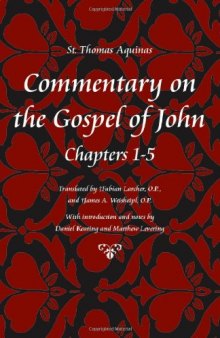دانلود کتاب Commentary on the Gospel of John, Chapters 1-5
by Thomas Aquinas|
|
عنوان فارسی: تفسیر در انجیل یوحنا، فصل 01/05 |
 دانلود کتاب
دانلود کتاب
 جزییات کتاب
جزییات کتاب
 درباره نویسنده
درباره نویسنده
 قدیس توماس آکویناس ، معروف به حکیم آسمانی، فیلسوف ایتالیایی و متاله مسیحی بود. او سعی داشت فلسفهی ارسطو را با مسیحیت تلفیق کند یا بعبارتی دیگر آمیزهای از علم و ایمان بسازد. او اعتقاد داشت که هیچ تضادی میان فلسفه و عقل با اعتقادات کلیسایی وجود ندارد و فلسفه و مسیحیت در واقع یک چیز میگویند. هنر بزرگ توماس آکوئیناس این بود که ثابت کرد ایمان و منطق باهم تعارضی ندارند، زیرا در زمان او جمعی معتقد بودند که ارسطو و اعراب بیدینند و باید نفوذ خطرناک این ملحدین را ریشهکن کرد. این عده میگفتند که هرگونه استدلال عقلی دربارهی دیانت، شکلی از ضعف و فتور است؛ اما آکوئیناس ثابت کرد که با منطق و استدلال عقلانی نمیتوان ایمان و دیانت را به خطر انداخت، همین امر برای عقلا آرادی عمل ایجاد کرد تا به اندیشه و تعقل بپردازند. در قیاس فلسفهی مسیحیِ آکوئیناس با دنیای اسلام، همین بس که در جهان اسلامی عقیده بر آن بود که خلفای راشدین، قرآن را به طرزی شایسته و صحیح تفسیر کردهاند و بدین نحو به قول مسلمین «این باب بسته شدهبود» و ار این رو درخت برومند و بارور حکمت عرب که چند قرن در اعتلا بود خشکید. فلسفه او از ۱۸۷۹ تا اواسط دهه ۱۹۶۰ میلادی فلسفه رسمی کلیسای کاتولیک بود.
قدیس توماس آکویناس ، معروف به حکیم آسمانی، فیلسوف ایتالیایی و متاله مسیحی بود. او سعی داشت فلسفهی ارسطو را با مسیحیت تلفیق کند یا بعبارتی دیگر آمیزهای از علم و ایمان بسازد. او اعتقاد داشت که هیچ تضادی میان فلسفه و عقل با اعتقادات کلیسایی وجود ندارد و فلسفه و مسیحیت در واقع یک چیز میگویند. هنر بزرگ توماس آکوئیناس این بود که ثابت کرد ایمان و منطق باهم تعارضی ندارند، زیرا در زمان او جمعی معتقد بودند که ارسطو و اعراب بیدینند و باید نفوذ خطرناک این ملحدین را ریشهکن کرد. این عده میگفتند که هرگونه استدلال عقلی دربارهی دیانت، شکلی از ضعف و فتور است؛ اما آکوئیناس ثابت کرد که با منطق و استدلال عقلانی نمیتوان ایمان و دیانت را به خطر انداخت، همین امر برای عقلا آرادی عمل ایجاد کرد تا به اندیشه و تعقل بپردازند. در قیاس فلسفهی مسیحیِ آکوئیناس با دنیای اسلام، همین بس که در جهان اسلامی عقیده بر آن بود که خلفای راشدین، قرآن را به طرزی شایسته و صحیح تفسیر کردهاند و بدین نحو به قول مسلمین «این باب بسته شدهبود» و ار این رو درخت برومند و بارور حکمت عرب که چند قرن در اعتلا بود خشکید. فلسفه او از ۱۸۷۹ تا اواسط دهه ۱۹۶۰ میلادی فلسفه رسمی کلیسای کاتولیک بود. 








 این کتاب رو مطالعه کردید؟ نظر شما چیست؟
این کتاب رو مطالعه کردید؟ نظر شما چیست؟
